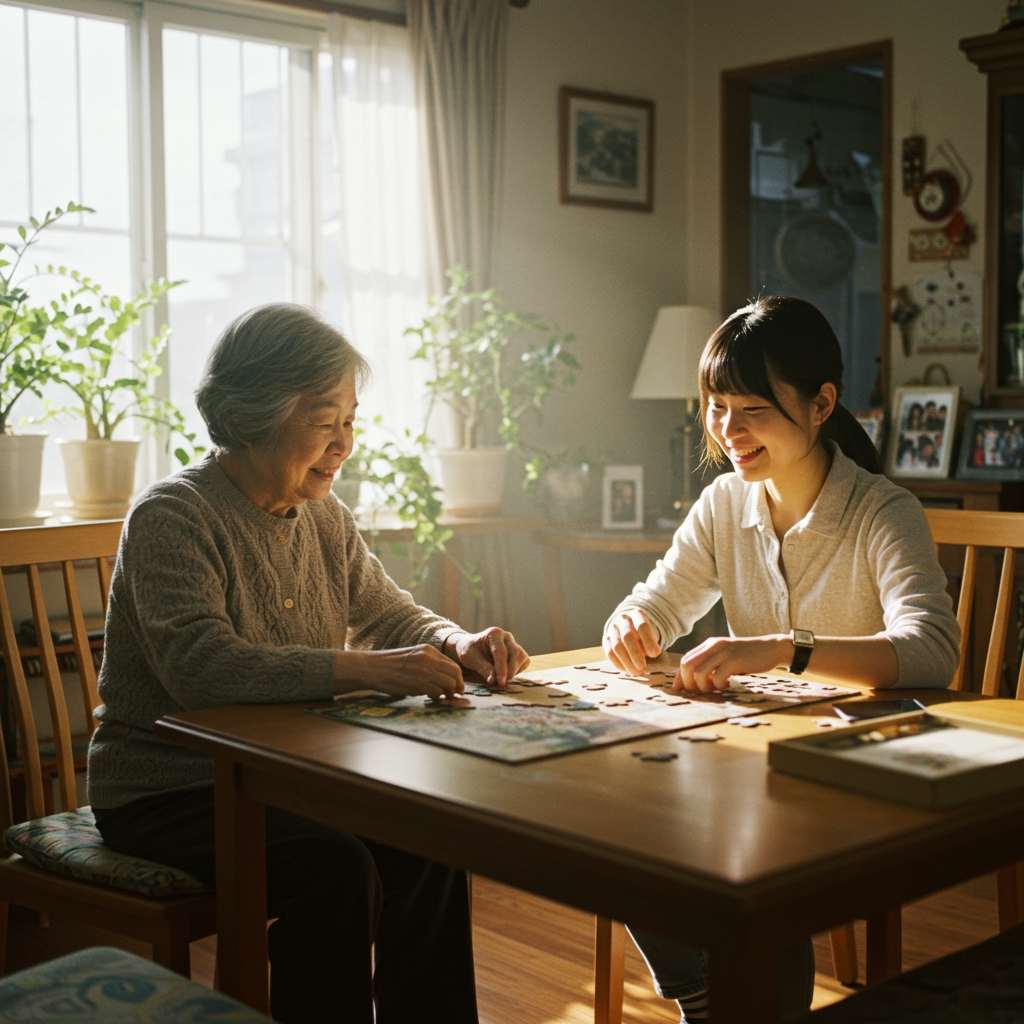認知訓練的重要性
研究顯示,即使在失智症的早期階段,透過認知訓練也能有效改善病人的注意力、記憶力、執行功能和情緒。及早開始,並持之以恆,能最大限度地發揮認知訓練的益處。
居家認知訓練的核心原則
在開始居家認知訓練之前,請務必了解以下原則:
個別化
每個失智症病人的認知能力、興趣和偏好都不同。因此,訓練內容需根據病人的具體情況進行調整,確保活動具有挑戰性,但又不會過於困難,以致產生挫敗感。
趣味性
選擇病人喜歡的活動,並將訓練融入日常生活中,使其更具吸引力。避免強制或過度強調「訓練」,以免引起反感。
漸進性
隨著病人能力的提升,逐步增加訓練的難度。但也要留意病人的反應,適時調整。
支持性
提供鼓勵和支持,營造輕鬆愉快的訓練氛圍。避免批評或指責,並給予充分的肯定和讚美。
安全性
確保訓練環境安全,避免病人發生意外。
居家認知訓練的方法
以下是一些適合在家中進行的認知訓練活動:
記憶遊戲
- 配對遊戲: 使用圖卡、撲克牌或照片,讓病人尋找配對的物品。
- 記憶力配對: 將數樣物品放在桌上,讓病人看一段時間後蓋住,然後請他們回憶物品的名稱和位置。
- 說故事遊戲: 一起閱讀一篇短篇故事,然後請病人回憶故事的內容和情節。
- 回憶往事: 鼓勵病人分享過去的經歷和回憶,例如童年趣事、工作經歷或旅行見聞。
益智遊戲
- 拼圖: 選擇適合病人能力的拼圖,鼓勵他們完成。
- 積木: 使用積木進行搭建,有助於提升空間感和手眼協調能力。
- 數獨、填字遊戲: 選擇難度適中的數獨或填字遊戲,鍛鍊邏輯思維和語言能力。
- 象棋、撲克牌: 與病人一起下象棋或玩撲克牌,促進思考和策略能力。
閱讀
- 閱讀報紙、雜誌: 選擇病人感興趣的報紙或雜誌,一起閱讀並討論內容。
- 閱讀書籍: 選擇簡單易懂的書籍,例如散文、詩歌或故事,與病人一起閱讀。
- 朗讀: 鼓勵病人朗讀文章或書籍,鍛鍊語言表達能力和記憶力。
繪畫與藝術活動
- 繪畫、塗色: 提供畫筆、顏料或色鉛筆,讓病人自由創作。
- 手工藝: 製作簡單的手工藝品,例如摺紙、剪紙或黏土。
- 音樂欣賞: 一起欣賞音樂,鼓勵病人哼唱或跳舞。
烹飪
- 一起準備餐點: 邀請病人參與簡單的烹飪活動,例如洗菜、切菜或攪拌食材。
- 烘焙: 一起製作餅乾、蛋糕或麵包,享受烹飪的樂趣。
- 回憶食譜: 請病人分享他們擅長的菜餚,並一起回憶食譜。
購物
- 一起去超市: 讓病人參與購物清單的制定,並協助挑選商品和結帳。
- 辨識貨幣: 讓病人練習辨識不同面額的貨幣,並進行簡單的計算。
使用電話
- 練習撥號: 讓病人練習撥打電話號碼,並與親友進行簡短的通話。
- 視訊通話: 使用視訊通話與遠方的親友聯繫,增進互動。
其他注意事項
規律作息
保持規律的作息時間,有助於改善病人的睡眠品質和認知功能。
適度運動
鼓勵病人進行適度的運動,例如散步、太極拳或瑜伽。
營養均衡
提供營養均衡的飲食,有助於維持病人的身體健康和認知功能。
社會互動
鼓勵病人參與社交活動,與他人交流互動,避免孤獨和隔離。
尋求專業協助
如果您在照顧失智症病人的過程中遇到困難,請及時尋求專業醫師或照護人員的協助。
結語
居家認知訓練是照顧失智症病人的重要一環。透過上述方法,您可以幫助病人維持認知功能,提升生活品質,並減輕家庭的照護負擔。請記住,耐心、愛心和支持是成功的關鍵。
最後,請務必諮詢專業醫師或治療師,制定最適合您家人情況的認知訓練計畫。
Reference
[1] Computerised cognitive training for maintaining cognitive function in cognitively healthy people in midlife. /The Cochrane database of systematic reviews /2019 LINK
[2] Mindfulness and Cognitive Training Interventions in Mild Cognitive Impairment: Impact on Cognition and Mood. /The American journal of medicine /2021 LINK
[3] HomeBased Computerized Cognitive Training for Postoperative Cognitive Dysfunction After Lung Transplantation in Elderly Population: A Randomized Controlled Trial. /The Journal of nervous and mental disease /2019 LINK
[4] Feasibility of Cognitive Training in Combination With Transcranial Direct Current Stimulation in a HomeBased Context (TrainStimHome): study protocol for a randomised controlled trial. /BMJ open /2022 LINK
[5] The importance of clarifying the conceptual basis underlying cognitionoptimizing interventions: Commentary on Moreau (2022). /The American psychologist /2022 LINK
[6] Interacting with television in one’s own home: The development of a cognitive stimulation television pilot episode for older people with dementia (Innovative Practice). /Dementia (London, England) /2020 LINK
[7] Toward rational use of cognitive training in those with mild cognitive impairment. /Alzheimer’s & dementia : the journal of the Alzheimer’s Association /2022 LINK
[8] Memory Strategy Training Can Enhance Psychoeducation Outcomes for Dementia Family Caregivers: A Randomized Controlled Trial. /International journal of aging & human development /2021 LINK
[9] Effects of SmartphoneBased Compensatory Cognitive Training and Physical Activity on Cognition, Depression, and SelfEsteem in Women with Subjective Cognitive Decline. /Brain sciences /2021 LINK
[10] An Individual Cognitive Stimulation Therapy App for People With Dementia and Their Carers: Protocol for a Feasibility Randomized Controlled Trial. /JMIR research protocols /2021 LINK
[11] Impact of Alzheimer’s Dementia on Caregivers and Quality Improvement through Art and Music Therapy. /Healthcare (Basel, Switzerland) /2021 LINK
[12] Art Therapy: A Complementary Treatment for Mental Disorders. /Frontiers in psychology /2021 LINK
[13] “It is the beautiful things that let us live”: How engaging in creative activities outside of standardized interventions helps family members of persons with Dementia. /Dementia (London, England) /2022 LINK
[14] The use of technology for artsbased activities in older adults living with mild cognitive impairment or dementia: A scoping review. /Dementia (London, England) /2022 LINK
[15] Designing Supportive Soundscapes for Nursing Home Residents with Dementia. /International journal of environmental research and public health /2019 LINK
[16] DementiaFriendly “Design”: Impact on COVID19 Death Rates in LongTerm Care Facilities Around the World. /Journal of Alzheimer’s disease : JAD /2021 LINK
[17] Features of the social and built environment that contribute to the wellbeing of people with dementia who live at home: A scoping review. /Health & place /2021 LINK
